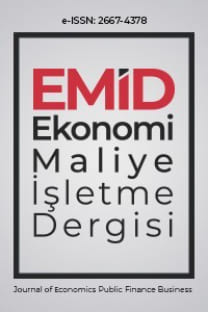ULUSLARARASI POLİTİK EKONOMİ AÇISINDAN BİLGİ VE İLETİŞİM TEKNOLOJİLERİNİN ÖNEMİ VE BİLGİ YEDİEMİNLİĞİ KAVRAMI
Tarih boyunca dünya, doğal kaynaklar etrafında cereyan eden birçok çatışmaya sahne olmuştur. Bugün ise, devlet ve çok uluslu şirketlerin farklı bir kaynaktan pay elde edebilmek için faaliyet yürüttüğü görülmektedir. Bilgi ve iletişim teknolojilerini kullanan ekipman ve hizmetlerin ürettiği bilgi, bunun en güzel örneğidir. Sanayi İnkılabı’nın üçüncü dalgasının başladığı tarihten günümüze kadar bilgi; siyasi, ekonomik, toplumsal ve ideolojik birçok tartışmanın konusu olmuştur. Bu çalışmada, kritik bir güç kaynağı olarak bilgi ve onun politik ekonomi açısından önemi sorgulanacak, siyasi ve ekonomik gelişmeleri değerlendirmede oynadığı rol ayrıntılı bir şekilde incelenecektir. Çalışmada ayrıca devlet, şirket ve toplum arasındaki karmaşık ilişkiyi daha iyi anlayabilmek için bilgi güvenliği, bilgi yönetimi ve bilgi akışının kontrolü ile ilgisi bulunan bilgi yedieminliği kavramı literatürdeki kıt kaynaklar dikkate alınarak açıklanacaktır.
Anahtar Kelimeler:
Uluslararası Politik Ekonomi, Bilgi ve İletişim Teknolojileri, Yumuşak Güç, Bilgi Yedieminliği
___
- Allcott, H., & Gentzkow, M. (2017). Social Media and Fake News in the 2016 Election. The Journal of Economic Perspectives, 211 - 235.
- Balkin, J. M. (2016). Information Fiduciaries and the First Amendment. Faculty Scholarship Series, 1185 - 1221.
- Balkin, J. M. (2020). The Fiduciary Model of Privacy. Harvard Law Review Forum, 11 - 34.
- Berger, A. (1953). Fiduciary, Encyclopedic dictionary of Roman law, 471 - 472: The American Philosophical Society.
- Berkowitz, B. (1995). Warfare in the Information Age. Science and Technology, 12(1), 59 - 66: RAND Corporation.
- DeMott, D. A. (1988). Beyond Metaphor: An Analysis of Fiduciary Obligation. Duke Law Journal, 882.
- Deutsch, K. W. (1967). On the Concepts of Politics and Power. Journal of International Affairs, 232 - 241.
- DOMO. (2020). Data Never Sleeps 8.0. https://www.domo.com/learn/data-never-sleeps-8 (23.03.2021)
- Dunaway, J. (2018). News Attention in a Mobile Era. Journal of Computer-Mediated Communication, 107 - 109.
- Gartner. (2018). Global IT Spending to Grow 3.2 Percent in 2019. https://www.gartner.com/en/newsroom/pressreleases/2018-10-17-gartner-says-global-it-spending-to-grow-3-2-percent-in-2019 (25.03.2021)
- Gartner. (2021). Gartner Forecasts Worldwide IT Spending to Grow 6.2% in 2021. Gartner.
- Grauer, M. (2001). Information Technology. International Encyclopedia of the Social & Behavioral Sciences
- Hart, J. A. (2010). Information Technologies and the Global Political Economy.
- Holst, A. (2019). Smartphone users worldwide 2016-2021. Statista: https://www.statista.com/statistics/330695/number-of-smartphone-users-worldwide/ (25.03.2021)
- Ihara, K. (2019). Taiwan loses 3,000 chip engineers to 'Made in China 2025'. Nikkei: https://asia.nikkei.com/Business/China-tech/Taiwan-loses-3-000-chip-engineers-to-Made-in-China-2025 (25.03.2021)
- Khan, L. M., & Pozen, D. E. (2019). A Skeptical View of Information Fiduciaries. Harvard Law Review, 498 - 541.
- McCarthy, D. R. (2015). Power, Information Technology, and International Relations Theory. Melbourne: Palgrave Macmillan.
- Nye Jr., J. S. (2017). Information warfare versus soft power. The Strategist: https://www.aspistrategist.org.au/information-warfare-versus-soft-power/ (26.03.2021)
- Nye Jr., J. S. (1990). Soft Power. Foreign Policy, 153 - 171.
- Osiander, A. (1998). Rereading Early Twentieth-Century IR Theory: Idealism Revisited. International Studies Quarterly, 417.
- Raconteur (2019), A Day in Data, Raconteur.net: https://www.raconteur.net/infographics/a-day-in-data (25.03.2021)
- Rosenau, J. N. (2002). Information Technologies And The Skills, Networks, and Structures That Sustain World Affairs. Governing Globalization: Power, Authority and Global Governance. (Ed. J. Rosenau ve J. P. Singh) Cambridge.
- Rubio, M. (2019). Letter to Secretary Mnuchin. https://cdn.voxcdn.com/uploads/chorus_asset/file/19273614/20191009_Letter_to_Secretary_Mnuchin_re_TikTok.pdf (23.03.2021)
- Ryall, J. (2017). Possibility of Toshiba sell-off to Chinese firms sparks national security fears in Japan. South China Morning Post: https://www.scmp.com/news/asia/east-asia/article/2082501/possibility-toshiba-sell-chinese-firms-sparks-national-security (23.03.2021)
- Saijo, K. (2017). Toshiba's fate tied to US-China tussle for chip dominance. Nikkei: https://asia.nikkei.com /Politics/Toshiba-s-fate-tied-to-US-China-tussle-for-chip-dominance (25.03.2021)
- Schandler, T. (2013). 2013 Mobile Workforce Adoption Trends. Forrester.
- Schroeder, R. (2018). Big data: shaping knowledge, shaping everyday life. Social Theory after the Internet. (Ed. R. Schroeder). 126 - 148: UCL Press. Semiconductor Industry Association. (2020). 2020 State of The US Semiconductor Industry. SIA.
- SINTEF. (2013, Mayıs 2). Big Data, for better or worse: 90% of world's data generated over last two years. Science Daily: https://www.sciencedaily.com/releases/2013/05/130522085217.htm (23.03.2021)
- Talbot, D. (2013). Big Data from Cheap Phones. MIT Technology Review: https://www.technologyreview.com/s/513721/big-data-from-cheap-phones/ (19.12.2019)
- Zimmern, A. (1928). The Prospects for Democracy. International Affairs, 153 - 191.
- Zittrain, J. (2018). How to Exercise the Power You Didn't Ask For. Harvard Blogs: https://blogs.harvard.edu/jzwrites/2018/10/29/how-to-exercise-the-power-you-didnt-ask-for/ (26 03 2021)
- Yayın Aralığı: Yılda 2 Sayı
- Başlangıç: 2018
- Yayıncı: Adil AKINCI
Sayıdaki Diğer Makaleler
BİR KUŞAK-BİR YOL PROJESİ KAPSAMINDA AKDENİZ TİCARET LİMANLARINDA TÜRKİYE FIRSATLARI
COVID-19 PANDEMİSİNİN ULUSLARARASI SERMAYE HAREKETLİLİĞİ ÜZERİNE ETKİSİ: TÜRKİYE ÖRNEĞİ
EKONOMİK ENTEGRASYONLARA KATILIMIN TÜRKİYE'NİN DIŞ TİCARETİNE ETKİLERİ:PANEL VERİ ANALİZİ
Oğuzhan ÖZÇELİK, Elçin AYKAÇ ALP
İNSANA YAKIŞIR İŞ VE ÇALIŞAN YOKSULLAR: İŞGÜCÜ PİYASASI ÇERÇEVESİNDE BİR DEĞERLENDİRME
BANKALARIN İNSAN KAYNAKLARI ALANINDA INSTAGRAM PAYLAŞIMLARI ÜZERİNE BİR ARAŞTIRMA
EKONOMİK ENTEGRASYONLARA KATILIMIN TÜRKİYE'NİN DIŞ TİCARETİNE ETKİLERİ:PANEL VERİ ANALİZİ
